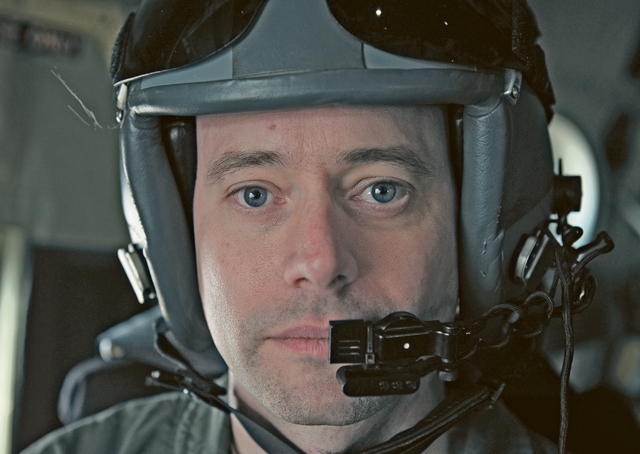
The sun was just beginning to glow across the dark skies of Mali in late May, 2014. As the western African nation came to life, Airmen from the 37th Airlift Squadron were double checking secured cargo and pressurized oxygen tanks, preparing for takeoff in a Ramstein C-130J Super Hercules.
Master Sgt. Boris Brink, 37th AS operations superintendent, was a loadmaster for the five-hour flight to Mali. He slowly made his way up and down the plane, ensuring 80 passengers were strapped in and ready to go and 10 aircrew members were prepared for takeoff. With the final traveler giving a thumbs-up to Brink, he continued moving around the plane alongside his wingman, Tech. Sgt. Justin Pike, a former 37th AS loadmaster.
Brink checked off his list of procedures. The oxygen was hooked up, the cargo was securely locked into the rail system, and the emergency equipment was ready to be used.
He finally secured his seat belt as the roar of the engines flooded the cargo hold. He felt his body push back into the chair as the plane lifted off the ground and flew into the dimly lit skies.
It would only be moments later that Brink was alerted of a malfunction in the aircraft.
“At the time, I was performing my (post-takeoff) checklist,” Brink said. “I noticed the ramp locks were retracting.”
Both Brink and Pike attended to the issue and worked to find a solution. No more than five minutes later, the advisory, caution and warning system went off.
“There was an air leakage,” Brink said. “So I told Pike to turn the ramp pump on. Around the time we did that, we heard what sounded just like an explosion coming from the direction of the ramp.”
Following the loud blast of noise, the ramp collapsed open and dust swarmed around the cargo-hold area. The sound of the engines flooded the plane. In seconds, the loadmasters’ work environment became a very dangerous place, but Brink wasn’t going to lose his mind because of the chaos.
“We didn’t expect it, but because of the training we went through, I think we were both calm enough to notify the pilot that the ramp was completely open,” Brink said. “We went straight into our emergency procedures.”
The two busy loadmasters continued to monitor the passengers as they ran through their list of tasks for emergency protocols. They accomplished this while communicating with the other two members of the crew in the cockpit, Capt. Derrick Hoxie and Capt. Kenneth Jubb, pilot and co-pilot.
“We all worked really well together,” Jubb said. “When the ramp opened up, we were all thinking ‘has this ever happened before?’ Even with that in the back of our mind, I’d say the crew remained calm throughout the whole situation.”
For five hours, the plane was kept stable, despite having the ramp open and exposing the cargo hold to the elements. During this time, the pilots were deciding how to land without major damage.
“We planned the landing early,” Jubb said. “We took input from Ramstein Air Base and a Lockheed Martin specialist.”
As rays of light made their way into the cockpit, Hoxie and his crew knew it was near time to land. It was going to be the first open-ramp landing ever performed in a C-130J. Upon their slow approach to Mali, there weren’t any second guesses from the crew. Despite a lack of guidance available, they were going with their initial strategy.
“It became a matter of just executing the plan,” Jubb said. “We were all pretty confident about everything.”
From the back of the plane, Brink watched the ramp as it came closer to the ground. Landing flatter than usual, the plane flew down the runway until it slowed to taxi speeds, guided along and finally stood still on the parking spot. Brink unbuckled himself and inspected the gear, the 80 commuters and the ramp; there were no injuries or damage
In total, Hoxie, Jubb, Brink and Pike saved a $70 million aircraft, 5,000 pounds in equipment and 80 lives. They were awarded the Air Medal Feb. 19 for their meritorious actions in flight.
“To me, I feel like I just did my job like I’m supposed to,” Brink explained. “However, it’s nice to be recognized for something like that so people understand what we do.”
For Brink and his crew members, it’s back to work. For the dozens of lives saved, the heroics that the Airmen performed that dark morning in Mali are never going to be forgotten.


